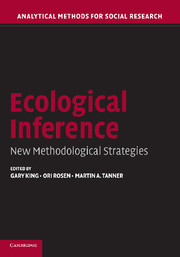Book contents
- Frontmatter
- Contents
- Contributors
- Preface
- INTRODUCTION
- PART ONE
- PART TWO
- PART THREE
- 9 Ecological Inference in the Presence of Temporal Dependence
- 10 A Spatial View of the Ecological Inference Problem
- 11 Places and Relationships in Ecological Inference
- 12 Ecological Inference Incorporating Spatial Dependence
- PART FOUR
- Index
10 - A Spatial View of the Ecological Inference Problem
Published online by Cambridge University Press: 18 May 2010
- Frontmatter
- Contents
- Contributors
- Preface
- INTRODUCTION
- PART ONE
- PART TWO
- PART THREE
- 9 Ecological Inference in the Presence of Temporal Dependence
- 10 A Spatial View of the Ecological Inference Problem
- 11 Places and Relationships in Ecological Inference
- 12 Ecological Inference Incorporating Spatial Dependence
- PART FOUR
- Index
Summary
ABSTRACT
The ecological fallacy that often results from ecological inference has long been a contentious issue in sociology, geography, epidemiology, and statistics. Several different solutions to the ecological inference problem have been proposed in these different disciplines. When grouped data are created by spatial aggregation, as is typically the case with Census data, the ecological inference problem can be considered as a special case of what is known in the field of geostatistics as the change-of-support problem (COSP). In this chapter, we give a brief overview of the causes of the ecological inference problem as it arises in geographical correlation studies. We relate the aggregation and specification biases resulting from the ecological fallacy to the scale and aggregation effects underlying the modifiable areal unit problem (MAUP) in geography. We introduce the COSP in spatial statistics, and show that the ecological inference problem and the MAUP, as well as the map overlay operations conducted within geographical information systems (GISs), are all special cases of the COSP. Geostatistical solutions to simple COSPs indicate a general solution strategy for these problems. We review some of these solutions and discuss some of the most recent statistical solutions to COSPs.
Information
- Type
- Chapter
- Information
- Ecological InferenceNew Methodological Strategies, pp. 233 - 244Publisher: Cambridge University PressPrint publication year: 2004
Accessibility standard: Unknown
Why this information is here
This section outlines the accessibility features of this content - including support for screen readers, full keyboard navigation and high-contrast display options. This may not be relevant for you.Accessibility Information
- 9
- Cited by
